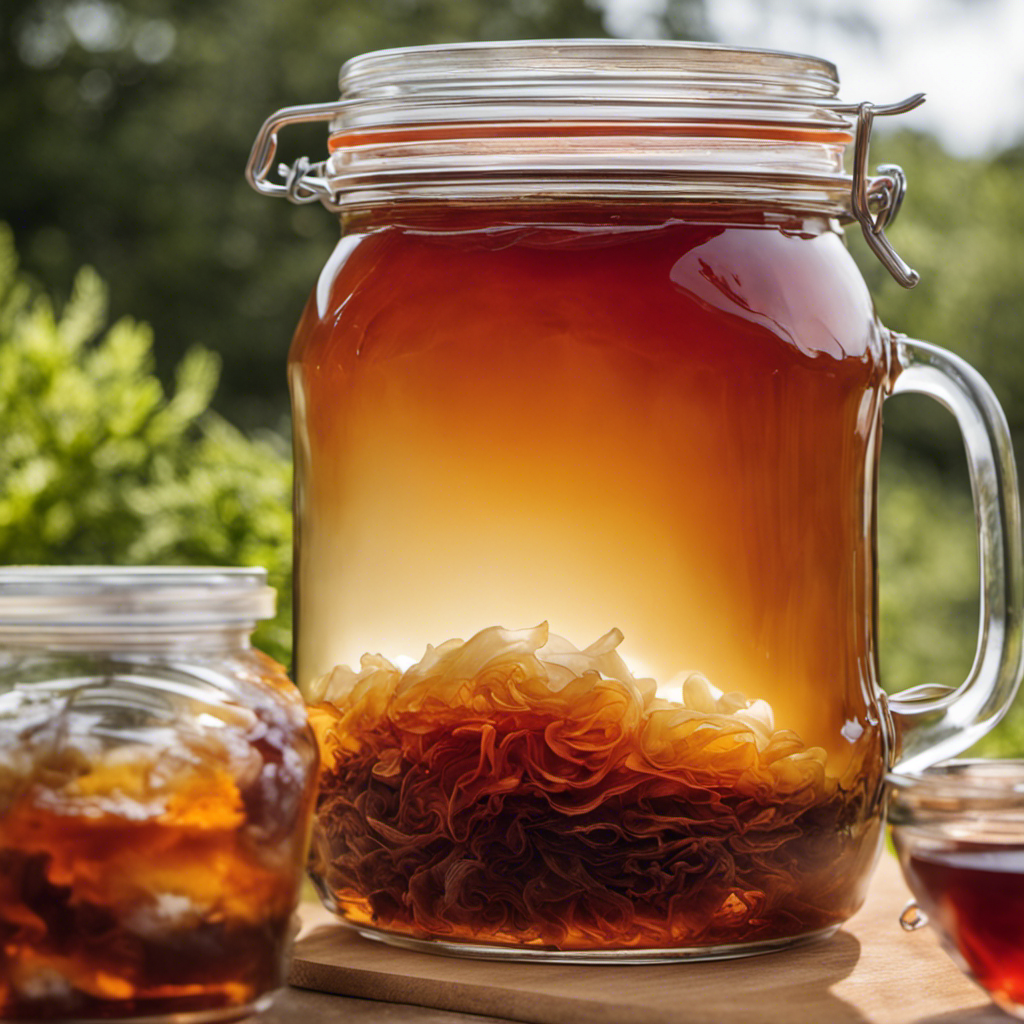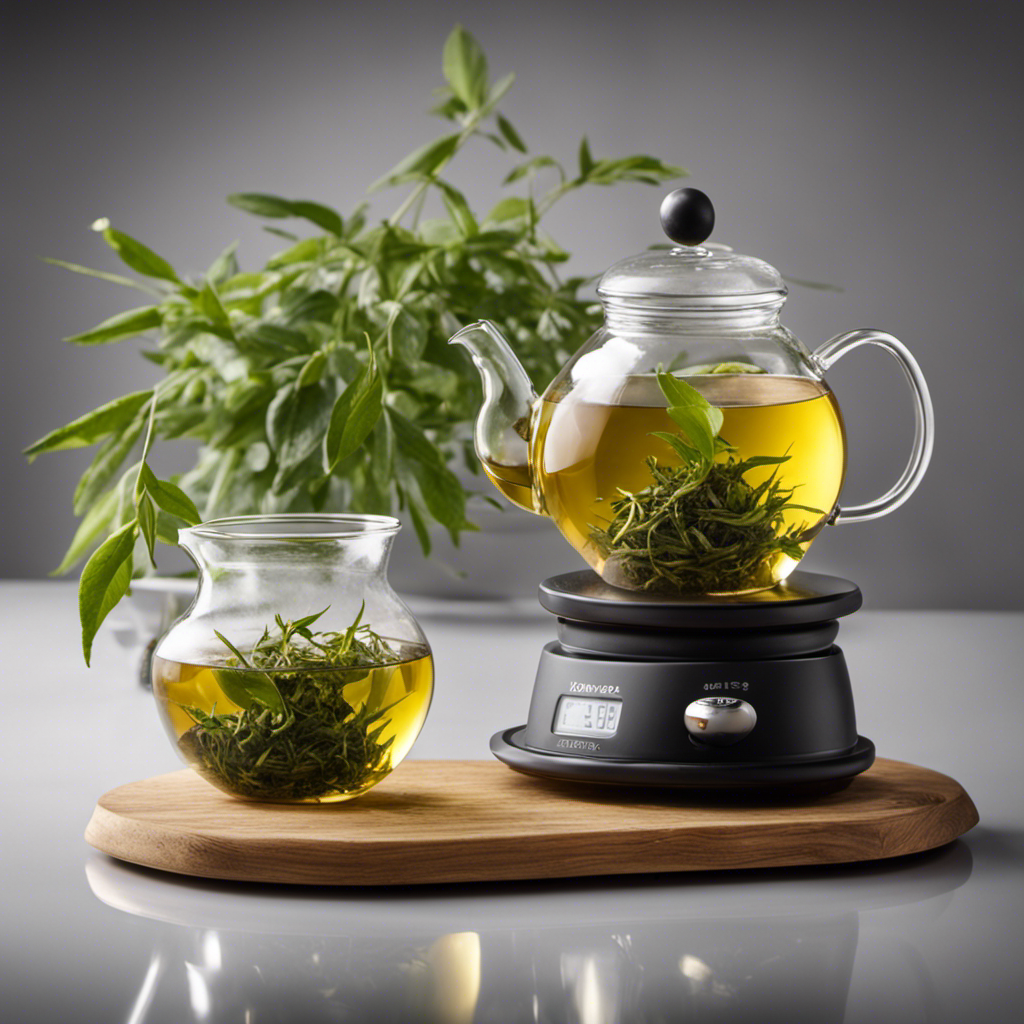Turmeric Tea
Is It Safe To Drink Fennel Tea Everyday

As the saying goes, ‘An apple a day keeps the doctor away.’ But what about fennel tea? Is it safe to drink fennel tea every day?
This question has been on my mind lately, and I’ve done some research to find the answer. Fennel tea has gained popularity in recent years due to its potential health benefits. It is known for its soothing properties and digestive benefits.
But before we dive into the safety of drinking fennel tea daily, let’s first understand its composition. Fennel tea is made from the seeds of the fennel plant, which contain essential oils, antioxidants, and other beneficial compounds. These components contribute to its potential health benefits.
However, like any herbal tea, moderation is key. It is essential to consider the daily recommended intake and potential side effects of fennel tea. Additionally, specific personal factors, such as pregnancy, breastfeeding, and age, should be taken into account.
In this article, we will explore the safety of drinking fennel tea every day and provide evidence-based information to help you make an informed decision.
Key Takeaways
- Fennel tea contains essential oils, antioxidants, and beneficial compounds that can aid in digestion and relieve bloating, gas, and stomach cramps.
- Excessive consumption of fennel tea can lead to liver damage and hormonal imbalance, so it should be consumed in moderation.
- Fennel tea may interact with medications and supplements, potentially reducing their effectiveness, so it’s important to consult with a healthcare professional before regular consumption, especially if taking prescription medications.
- While fennel tea can have various health benefits, personal factors such as age, overall health, and existing medical conditions should be considered, and moderation is key to avoid unwanted side effects.
Potential Health Benefits of Fennel Tea
If you choose to consume fennel tea on a daily basis, you’ll experience a potential array of health benefits. Fennel tea has been used for centuries in culinary traditions and is known for its potential digestive properties.
Fennel tea can be made by steeping crushed fennel seeds in hot water, and it has a pleasant, aromatic taste that’s reminiscent of licorice.
One of the potential culinary uses of fennel tea is its ability to aid in digestion. Fennel seeds contain compounds that can help relax the muscles in the digestive tract, which may help relieve bloating, gas, and stomach cramps. Additionally, fennel tea has been used as a natural remedy for indigestion and heartburn. It can also act as a mild diuretic, helping to reduce water retention and promote healthy urine flow.
Understanding the composition of fennel tea is important for fully appreciating its potential health benefits. Fennel seeds contain essential oils, including anethole, which is responsible for its distinctive flavor and aroma. These essential oils also have antioxidant and anti-inflammatory properties, which may contribute to the potential health benefits of fennel tea.
Transitioning into the subsequent section about understanding the composition of fennel tea, it’s crucial to explore its potential effects on overall health and well-being.
Understanding the Composition of Fennel Tea
With its delicate blend of flavors and aromatic essence, sipping on fennel tea transports you to a serene herbal oasis. To fully understand the benefits and potential risks of drinking fennel tea daily, it’s important to delve into its composition.
Fennel tea is made from the seeds of the fennel plant (Foeniculum vulgare) and is rich in essential oils, vitamins, and minerals. An analysis of its composition reveals that fennel tea contains compounds such as anethole, fenchone, and estragole, which contribute to its unique taste and therapeutic properties.
Fennel tea is produced using various methods, including the infusion and decoction techniques. In the infusion method, hot water is poured over crushed fennel seeds and allowed to steep for a few minutes. This process helps extract the essential oils and other beneficial compounds from the seeds. On the other hand, the decoction method involves boiling the seeds in water for a longer period of time, which allows for a stronger flavor and enhanced extraction of nutrients.
Understanding the composition and production methods of fennel tea is crucial in assessing its safety for daily consumption. Transitioning to the subsequent section about the daily recommended intake of fennel tea, it’s important to consider the potential health benefits and any possible risks associated with excessive consumption.
Daily Recommended Intake of Fennel Tea
In understanding the daily recommended intake of fennel tea, it’s important to consider safe dosage guidelines and potential risks of excessive consumption.
As an individual who enjoys drinking fennel tea regularly, I’ve researched this topic extensively and I’ve found that the general recommendation is to consume no more than two to three cups per day. This is because excessive consumption of fennel tea can potentially lead to adverse effects such as liver damage and hormonal imbalance.
Safe Dosage Guidelines
Drinking fennel tea daily can provide a sense of comfort and reassurance, knowing that you’re safely adhering to the recommended dosage guidelines. Fennel tea is generally considered safe when consumed in moderation.
The safe consumption levels of fennel tea vary depending on factors such as age, overall health, and any existing medical conditions. It’s important to consult with a healthcare professional to determine the appropriate dosage for you.
While fennel tea is generally well-tolerated, potential side effects may include allergic reactions, gastrointestinal discomfort, and hormonal changes. It’s crucial to monitor your body’s response and adjust the dosage accordingly.
Transitioning into the next section about potential risks of excessive consumption, it’s important to maintain a balanced approach to ensure the continued safety and enjoyment of fennel tea.
Potential Risks of Excessive Consumption
Be cautious not to overindulge in fennel tea, as excessive consumption can lead to potential risks and may cause adverse effects on your health. While fennel tea is generally safe when consumed in moderation, consuming large amounts of it may have negative consequences. It’s important to be aware of the potential risks associated with excessive fennel tea consumption.
-
Potential benefits of fennel tea for digestion:
- Fennel tea has traditionally been used to aid digestion and relieve bloating.
- It may help soothe an upset stomach and promote healthy digestion.
-
Potential interactions with medications and supplements:
- Fennel tea may interact with certain medications and supplements, potentially reducing their effectiveness.
- It’s advisable to consult with your healthcare provider before consuming fennel tea if you’re taking any medications or supplements.
Excessive consumption of fennel tea can have potential risks and may interact with certain medications and supplements. In the next section, we’ll explore the potential side effects of fennel tea.
Potential Side Effects of Fennel Tea
However, you may want to consider the potential side effects of drinking fennel tea every day. While fennel tea is generally safe for most people, it can still cause some adverse reactions in certain individuals.
One potential side effect is the occurrence of allergic reactions. Some people may be allergic to fennel or other plants in the same family, such as celery or carrots. Symptoms of an allergic reaction may include itching, swelling, and difficulty breathing. If you experience any of these symptoms after consuming fennel tea, it’s important to seek medical attention immediately.
Another consideration is the potential impact on medication efficacy. Fennel tea contains compounds that can interact with certain medications, particularly those metabolized by the liver. These interactions can either increase or decrease the effectiveness of the medication, leading to potential health risks. It’s crucial to consult with a healthcare professional before consuming fennel tea regularly, especially if you take prescription medications.
While fennel tea can offer numerous health benefits, it’s essential to be aware of the potential side effects. Allergic reactions and interactions with medications are important factors to consider. If you experience any adverse effects, it’s important to discontinue use and consult with a healthcare provider.
Now, let’s move on to the next section about the safety of fennel tea during pregnancy.
Fennel Tea and Pregnancy
If you’re expecting a baby, it’s important to know the potential impact of consuming fennel tea during pregnancy. Fennel tea is commonly used for its potential health benefits, but its effects on pregnancy are not well-studied.
Here are some important considerations to keep in mind:
-
Fennel tea and fertility: Some studies suggest that fennel tea may have estrogen-like effects, which could potentially interfere with fertility. If you’re trying to conceive, it may be best to avoid fennel tea or consult with your healthcare provider.
-
Fennel tea and menstrual cramps: Fennel tea has been traditionally used to alleviate menstrual cramps due to its potential antispasmodic properties. However, there is limited scientific evidence to support this claim. If you experience severe menstrual cramps during pregnancy, it’s important to consult with your healthcare provider for appropriate management options.
-
Fennel tea and pregnancy: Due to the limited research available, it’s generally recommended to err on the side of caution and avoid consuming fennel tea during pregnancy. This is especially important during the first trimester when the baby’s organs are developing.
Transition: Now that we’ve discussed the potential impact of fennel tea during pregnancy, let’s explore its effects on breastfeeding.
Fennel Tea and Breastfeeding
When you’re breastfeeding, it’s important to consider the potential effects of consuming fennel tea. Fennel tea has been used for centuries to promote breast milk production and aid in infant digestion. It contains compounds that can stimulate the mammary glands and increase milk flow, which can be beneficial for nursing mothers who may be struggling with low milk supply.
Additionally, fennel tea has been shown to have a soothing effect on the gastrointestinal tract, helping to relieve colic and other digestive issues in infants.
However, it’s important to note that while fennel tea can have positive effects on breast milk production and infant digestion, it should still be consumed in moderation. Like any herbal tea, excessive consumption of fennel tea can have negative effects. It is always best to consult with a healthcare provider before incorporating fennel tea or any other herbal remedies into your breastfeeding routine.
Transitioning into the subsequent section about ‘fennel tea and children’, it’s important to understand the potential benefits and risks of introducing fennel tea to your child’s diet.
Fennel Tea and Children
Introducing fennel tea to your child’s diet can have potential benefits for their digestion and overall well-being. Here are four reasons why fennel tea can be a great addition to your child’s routine:
-
Allergies: Fennel tea is known for its anti-inflammatory properties, which can help alleviate symptoms of allergies. It can reduce nasal congestion, sneezing, and itching, providing relief to your child.
-
Digestive Health: Fennel tea has been used for centuries to soothe digestive issues in both children and adults. It can help ease stomachaches, bloating, and gas, promoting a healthy digestive system in your child.
-
Calming Effect: Fennel tea has a mild, naturally sweet taste that can help calm your child. It can be a great option to offer before bedtime or during times of stress, helping them relax and unwind.
-
Hydration: Encouraging your child to drink fennel tea can be a healthy alternative to sugary beverages. It can keep them hydrated while introducing them to the benefits of herbal teas.
Incorporating fennel tea into your child’s daily routine can be a wise choice for their well-being. However, it’s important to consider the long-term effects of daily fennel tea consumption, which we’ll explore in the next section.
Long-Term Effects of Daily Fennel Tea Consumption
Beware of the potential risks that come with consuming fennel tea on a daily basis. While fennel tea is generally considered safe when consumed in moderation, there are potential long-term health effects to be aware of. One of the main concerns is the impact on digestion and gut health.
Fennel tea has been traditionally used to aid digestion and relieve digestive discomfort. However, excessive consumption of fennel tea can lead to several issues. The table below highlights some of the potential long-term effects of daily fennel tea consumption on digestion and gut health:
| Potential Long-Term Effects | Impact on Digestion and Gut Health |
|---|---|
| Hormonal imbalance | May disrupt normal digestive processes |
| Liver damage | Excessive fennel tea intake can strain the liver |
| Diarrhea | Fennel tea’s laxative properties may cause frequent bowel movements |
| Allergic reactions | Some individuals may develop allergies to fennel |
It’s important to note that individual reactions may vary, and these effects are not guaranteed for everyone. However, considering the potential risks, it is advisable to consult with a healthcare professional before incorporating fennel tea into your daily routine. Alongside personal factors to consider, such as medical history and current medications, they can provide personalized guidance on whether daily fennel tea consumption is suitable for you.
Personal Factors to Consider
When it comes to the long-term effects of daily fennel tea consumption, there are personal factors to consider. It’s important to remember that every individual is unique and may react differently to certain substances.
While fennel tea is generally considered safe and beneficial for most people, it’s always wise to take into account your own personal tolerance and any potential sensitivities or allergies you may have.
Factors such as age, overall health, and any existing medical conditions should also be taken into consideration. If you have any concerns or are unsure about whether it’s safe for you to drink fennel tea every day, it’s always best to consult with a healthcare professional.
Additionally, it’s worth noting that moderation is key. Even though fennel tea has numerous health benefits, excessive consumption may lead to unwanted side effects such as digestive issues or allergic reactions. It’s always recommended to follow the recommended dosage and listen to your body’s signals.
While fennel tea can be a beneficial addition to your daily routine, personal factors and individual tolerance should be considered. It’s always best to consult with a healthcare professional and listen to your body to ensure a safe and enjoyable tea-drinking experience.
Frequently Asked Questions
Can fennel tea help with weight loss?
Yes, fennel tea has been found to potentially aid in weight loss. Research suggests that fennel tea may boost metabolism, helping to burn calories more efficiently. Additionally, it may help suppress appetite, reducing the urge to overeat.
While more studies are needed to fully understand its effects, incorporating fennel tea into a balanced diet and exercise routine may support weight loss efforts.
Does fennel tea have any impact on blood pressure?
Fennel tea has been shown to have a positive impact on heart health. Studies suggest that fennel tea can help lower blood pressure levels due to its diuretic properties, which may reduce the strain on the heart.
Additionally, fennel tea has been found to lower cholesterol levels by inhibiting the absorption of cholesterol in the intestines.
These benefits make fennel tea a potentially beneficial addition to a heart-healthy lifestyle.
Can fennel tea improve digestion?
Fennel tea is like a gentle breeze that revitalizes your digestive system. It’s been shown to improve gut health by soothing the stomach and reducing bloating. Studies have found that fennel tea can help relax the muscles in the gastrointestinal tract, aiding in digestion and reducing discomfort. Incorporating fennel tea into your daily routine can be a natural and effective way to support a healthy digestive system.
Does fennel tea have any effect on skin health?
Fennel tea can have a positive impact on skin health. It’s anti-inflammatory properties can help reduce acne and promote a clearer complexion. Additionally, fennel tea is rich in antioxidants that can combat free radicals, which contribute to premature aging. Regular consumption of fennel tea may contribute to a more youthful skin appearance.
However, it’s important to consult with a healthcare professional before making any significant changes to your daily routine.
Can fennel tea help with reducing menstrual cramps?
Fennel tea is a magical elixir that not only delights the taste buds but also possesses the power to alleviate menstrual cramps. This herbal concoction works wonders by reducing bloating and relieving indigestion, ensuring that you sail through that time of the month with ease. Its natural properties have been praised by many, backed by evidence that supports its effectiveness. So, why suffer when a cup of fennel tea can bring you sweet relief?
Conclusion
In conclusion, based on the evidence presented, it’s safe to say that drinking fennel tea every day can have many potential health benefits. However, it’s important to note that individual factors such as pregnancy, breastfeeding, and age should be taken into consideration. While fennel tea is generally considered safe, it’s always best to consult with a healthcare professional before making any changes to your daily routine.
So, go ahead and enjoy a cup of fennel tea every day, knowing that it can potentially enhance your overall well-being.
Noah, the Editor-in-Chief at Cappuccino Oracle, plays a pivotal role in shaping the voice and vision of our renowned platform. With an unwavering passion for coffee, coffee alternatives, and tea, Noah leads Cappuccino Oracle towards new horizons in the realm of coffee journalism.
Beyond his professional responsibilities, Noah serves as a mentor and guiding force for his team. His dedication to journalistic excellence and genuine love for coffee, coffee alternatives, and tea continue to inspire and motivate the Cappuccino Oracle family. In the ever-evolving world of these beverages, Noah’s leadership ensures that our platform remains at the forefront, delivering enlightening and enjoyable content to our readers worldwide.
Turmeric Tea
How Do Scoby Convert Tea to Kombucha

As I observe the graceful movement of the scoby in my fermenting vessel, I am astonished by the ability of this living organism to turn a basic cup of tea into a tangy and bubbly drink called kombucha.
In this article, I will delve into the fascinating world of kombucha fermentation and explore the role of the scoby in converting the tea into this probiotic-rich beverage.
We will uncover the factors that influence the scoby’s ability to perform this alchemical conversion and discover tips and tricks for achieving optimal tea to kombucha conversion.
Key Takeaways
- The scoby is essential for the fermentation process of kombucha, as it metabolizes sugars in the tea and produces organic acids, vitamins, and enzymes.
- Factors such as fermentation time, temperature, and tea-to-sugar ratio can affect the flavor and acidity of the final kombucha product.
- The scoby interacts with various components in tea, including caffeine, tannins, polyphenols, and sugars, enhancing the aromatics and adding complexity to the kombucha.
- To achieve optimal tea to kombucha conversion, it is important to use the proper temperature and steeping time for different types of tea, ensure water is free from contaminants, experiment with different tea blends, and get creative with unique flavors.
The Role of Scoby in Kombucha Fermentation
The scoby plays a crucial role in converting tea into kombucha. During the fermentation process, the scoby, which stands for ‘symbiotic culture of bacteria and yeast,’ acts as a living organism that metabolizes the sugars present in the tea. This metabolic activity results in the production of various compounds, including organic acids, vitamins, and enzymes, which give kombucha its unique flavor and health benefits.
Without the scoby, fermentation would not occur, and tea would remain just tea. The scoby acts as a biofilm, providing a surface for the microorganisms to adhere to and grow. It also creates a controlled environment by regulating the pH and oxygen levels, ensuring the optimal conditions for fermentation.
Therefore, the scoby is of utmost importance in kombucha production, as it drives the fermentation process and contributes to the transformation of tea into the tangy and fizzy beverage we know as kombucha.
In the following section, we will delve into the conversion process: tea to kombucha.
The Conversion Process: Tea to Kombucha
During fermentation, black or green tea mixed with sugar and the scoby undergoes a process that turns it into kombucha. This conversion process involves the interaction of various microorganisms that transform the tea and sugar mixture into a tangy and fizzy beverage.
To enhance the flavors of kombucha, different brewing techniques can be employed. These techniques include increasing the fermentation time, adjusting the temperature, and experimenting with different tea-to-sugar ratios. By manipulating these factors, a stronger and more complex flavor profile can be achieved.
Additionally, the type of tea used in kombucha fermentation can greatly impact the taste of the final product. Exploring different types of tea, such as black, green, oolong, or white tea, can result in unique kombucha flavors, ranging from earthy and robust to light and floral.
Factors Affecting Scoby’s Conversion of Tea to Kombucha
To enhance the flavors of your kombucha, you can experiment with different brewing techniques such as adjusting the fermentation time, temperature, and tea-to-sugar ratios. These factors greatly influence the fermentation process and can have a significant impact on the flavor profile of your kombucha. The fermentation time determines how long the bacteria and yeast in the scoby have to convert the tea and sugar into kombucha. This can range from 7 to 30 days, depending on your desired flavor and acidity. The temperature at which you ferment your kombucha also affects the flavor. Higher temperatures (around 80°F) result in a faster fermentation process and a more acidic flavor, while lower temperatures (around 70°F) produce a milder and smoother taste. Lastly, adjusting the tea-to-sugar ratio can alter the flavor intensity. A higher sugar content will yield a sweeter kombucha, while a lower sugar content will result in a more tart and tangy beverage.
| Factors Influencing Fermentation Process | Scoby’s Impact on Flavor Profile |
|---|---|
| Fermentation time | Sweetness and acidity |
| Temperature | Intensity of flavor |
| Tea-to-sugar ratio | Tartness and tanginess |
Understanding Scoby’s Interaction With Tea Components
When experimenting with brewing techniques, you can observe how different components in the tea interact with the scoby to create unique flavors. The scoby’s microbial ecosystem plays a crucial role in the fermentation process, breaking down the tea’s components and transforming them into kombucha.
Here’s a breakdown of the scoby’s interaction with tea components:
-
Caffeine: The scoby’s enzymes act on caffeine, breaking it down and reducing its concentration in the final brew.
-
Tannins: Tannins give tea its astringency. The scoby interacts with tannins, mellowing their flavor and reducing their impact on the kombucha’s taste.
-
Polyphenols: These compounds contribute to the tea’s antioxidant properties. The scoby metabolizes polyphenols, releasing flavorful metabolites and adding complexity to the kombucha.
-
Sugars: The scoby consumes sugars present in the tea, producing carbon dioxide and ethanol as byproducts.
-
Aromatics: The scoby’s fermentation process enhances the aromatics of the tea, resulting in a rich and diverse flavor profile.
Understanding these interactions allows brewers to manipulate the brewing process and create kombucha with varying flavors and characteristics.
Tips and Tricks for Optimal Tea to Kombucha Conversion
For the best results, it’s important to ensure the proper conversion of tea into kombucha by following these tips and tricks.
When it comes to brewing techniques, it’s crucial to use the right temperature and steeping time for your tea. Different types of tea require different brewing parameters, so be sure to research and follow the recommendations for each specific variety.
Additionally, pay attention to the quality of your water and make sure it is free from chlorine and other contaminants that can hinder the fermentation process.
As for flavor profiles, experiment with different tea blends to find the perfect combination that suits your taste buds. Some popular options include green tea, black tea, and herbal infusions. Don’t be afraid to get creative and try unique flavors like jasmine or earl grey.
Frequently Asked Questions
How Long Does It Take for the Scoby to Convert Tea Into Kombucha?
It takes several factors into account when determining how long it takes for the scoby to convert tea into kombucha. The presence of oxygen plays a crucial role in this conversion process.
Can I Use Any Type of Tea for Making Kombucha?
Using different types of tea for making kombucha can yield unique flavors and benefits. Green tea is commonly used, with its antioxidants and caffeine. Black tea provides a stronger flavor and more tannins, which aid in fermentation.
What Are the Signs That the Scoby Is Actively Converting Tea Into Kombucha?
Signs of active fermentation include the formation of a new scoby, a tangy taste, and the release of carbon dioxide bubbles. Kombucha benefits gut health due to the probiotics and organic acids it contains.
Can I Speed up the Conversion Process by Adding More Scoby to the Tea?
Adding more scoby to the tea may speed up the fermentation process. The benefits of using multiple scobies include increased microbial activity and a faster conversion of tea to kombucha.
Is There a Specific Temperature Range That Is Ideal for Scoby to Convert Tea Into Kombucha?
The ideal temperature range for scoby fermentation depends on several factors. Factors that can affect scoby’s ability to convert tea into kombucha include temperature, pH level, oxygen availability, and sugar content.
Conclusion
In conclusion, the role of Scoby in converting tea to kombucha is essential for the fermentation process.
Through its interaction with various components in tea, Scoby undergoes a complex conversion process that results in the creation of this popular fermented beverage.
Factors such as temperature, time, and tea quality can affect Scoby’s ability to convert tea effectively.
By understanding these interactions and implementing proper techniques, one can achieve optimal tea to kombucha conversion.
So, remember to maintain the right conditions and give your Scoby the best tea to ensure a successful fermentation process.
Noah, the Editor-in-Chief at Cappuccino Oracle, plays a pivotal role in shaping the voice and vision of our renowned platform. With an unwavering passion for coffee, coffee alternatives, and tea, Noah leads Cappuccino Oracle towards new horizons in the realm of coffee journalism.
Beyond his professional responsibilities, Noah serves as a mentor and guiding force for his team. His dedication to journalistic excellence and genuine love for coffee, coffee alternatives, and tea continue to inspire and motivate the Cappuccino Oracle family. In the ever-evolving world of these beverages, Noah’s leadership ensures that our platform remains at the forefront, delivering enlightening and enjoyable content to our readers worldwide.
Turmeric Tea
How Much Fat Is in Kombucha Tea

I am constantly seeking out low-fat beverages to maintain my health. That’s why I was curious to explore the benefits of kombucha tea.
In this article, we’ll dive into the nutritional profile of kombucha tea and explore its fat content. I’ll also share the health benefits of this popular drink and compare its fat content to other beverages.
So, if you’re curious about how much fat is in kombucha tea and how it fits into a low-fat diet, keep reading!
Key Takeaways
- Kombucha tea has a low-fat content, with less than 1 gram of fat per cup.
- It is also low in calories, with an average of 30 calories per cup, making it suitable for weight management.
- Kombucha tea is a probiotic powerhouse, supporting a healthy gut and digestion.
- Compared to high-fat beverages like soda and fruit juice, kombucha is a healthier option for reducing fat intake.
The Nutritional Profile of Kombucha Tea
You’ll be interested to know that kombucha tea has a low-fat content. This makes it a great beverage option for those who are looking to lose weight or maintain a healthy weight. In fact, a cup of kombucha tea typically contains less than 1 gram of fat.
This low fat content is one of the reasons why kombucha tea is often recommended as a healthier alternative to sugary drinks or high-fat beverages. Additionally, kombucha tea is also low in calories, with an average of 30 calories per cup.
This combination of low fat and low calorie content makes kombucha tea a suitable choice for individuals who are watching their weight. Understanding the fat content in kombucha tea is important in order to make informed choices about your diet and overall health.
Understanding the Fat Content in Kombucha Tea
Understanding the amount of fat in kombucha tea can be beneficial when it comes to managing your weight. Fortunately, kombucha tea is virtually fat-free, making it a great choice for those looking to shed some pounds. With its low fat content, kombucha tea can be a valuable addition to a weight loss plan.
This fermented beverage is made from tea, sugar, and a symbiotic culture of bacteria and yeast (SCOBY), which act together to create a tangy, fizzy drink. The fermentation process breaks down the sugars in the tea, resulting in a beverage that is low in calories and fat. So, if you’re watching your fat intake while trying to lose weight, kombucha tea can be a refreshing and guilt-free option.
Now that we’ve explored the fat content of kombucha tea, let’s delve into its numerous health benefits.
Exploring the Health Benefits of Kombucha Tea
If you’re looking to improve your overall health, exploring the benefits of kombucha tea can be a great place to start. Not only is it a refreshing beverage, but it also offers numerous health benefits.
Here are four reasons why you should consider incorporating kombucha tea into your daily routine:
-
Probiotic Powerhouse: Kombucha tea is fermented using a SCOBY (Symbiotic Culture of Bacteria and Yeast), which results in the production of beneficial bacteria and yeast. These probiotics can support a healthy gut and improve digestion.
-
Immune Boosting: The fermentation process of kombucha tea produces organic acids, such as acetic acid and gluconic acid, which have antimicrobial properties and can help strengthen the immune system.
-
Detoxification: Kombucha tea contains antioxidants and enzymes that aid in the detoxification process by supporting the liver’s natural detoxifying abilities.
-
Potential Health Benefits: Some studies suggest that kombucha tea may have potential benefits such as reducing inflammation, improving heart health, and supporting mental health.
Overall, kombucha tea can be a delicious and beneficial addition to your daily routine, thanks to its fermentation process and probiotic properties.
How Does Kombucha Tea Compare to Other Beverages in Terms of Fat
When it comes to comparing kombucha tea to other beverages, you’ll find that it generally has a lower fat content. This makes kombucha a healthier option for those who are watching their fat intake.
Let’s take a closer look at how kombucha compares to soda and fruit juice in terms of fat content.
Soda is known for being high in sugar and calories, but it also tends to have a higher fat content compared to kombucha. This is because soda often contains added fats like high fructose corn syrup, which can contribute to weight gain and other health issues.
On the other hand, fruit juice can vary in its fat content depending on the type and brand. While some fruit juices may contain small amounts of fat, it is generally lower than what you would find in soda. However, when compared to kombucha, fruit juice can still have a higher fat content.
Overall, if you’re looking to reduce your fat intake, opting for kombucha over soda or fruit juice can be a wise choice.
Tips for Incorporating Kombucha Tea Into a Low-Fat Diet
To incorporate kombucha into a low-fat diet, try adding a splash of it to your morning smoothie for a tangy twist. Here are four tips for incorporating kombucha tea into a low-fat diet:
-
Swap out sugary beverages: Replace high-fat drinks like soda or sugary juices with kombucha. Not only does kombucha have a lower fat content, but it also provides a refreshing and healthier alternative.
-
Use it as a marinade: Kombucha can be used as a flavorful marinade for meats and vegetables. Its tangy taste adds a unique twist to your dishes without adding unnecessary fat.
-
Make kombucha popsicles: Freeze kombucha into popsicle molds for a delicious and low-fat treat. It’s a great way to satisfy your sweet tooth without compromising your diet.
-
Mix it into dressings: Create a low-fat salad dressing by combining kombucha with olive oil, herbs, and spices. It adds a zesty flavor while keeping the fat content low.
Incorporating kombucha tea into a low-fat diet not only helps reduce fat intake but also provides numerous health benefits. Its probiotic properties support a healthy gut and immune system. Compared to other high-fat beverages, kombucha is a smart choice for those looking to maintain a low-fat diet.
Frequently Asked Questions
Can Drinking Kombucha Tea Help With Weight Loss?
Drinking kombucha tea may aid in weight loss. It’s believed to boost metabolism and reduce appetite. However, scientific evidence is limited, and other factors like diet and exercise play a significant role in overall effectiveness.
Is Kombucha Tea High in Calories?
Kombucha tea is a low-calorie beverage that can be enjoyed guilt-free. It contains minimal fat content, making it a healthy choice for those watching their calorie intake. So, go ahead and sip away!
Can Kombucha Tea Replace Other High-Fat Beverages in My Diet?
Kombucha tea can be a low-fat alternative to high-fat beverages in your diet. It is beneficial for weight management as it contains minimal fat content, making it a healthier choice.
Can Kombucha Tea Be a Part of a Low-Carb Diet?
Yes, kombucha tea can be a part of a low-carb diet. It has many benefits, such as aiding in weight loss and promoting ketosis. Incorporating kombucha into your diet can help you achieve your low-carb goals.
What Are the Potential Side Effects of Drinking Kombucha Tea?
Potential side effects of drinking kombucha tea include upset stomach, allergic reactions, and lactic acidosis. These health risks can be minimized by consuming it in moderation and ensuring the tea is properly brewed and stored.
Conclusion
In conclusion, after exploring the nutritional profile and fat content of kombucha tea, it’s evident that this fermented drink is an excellent choice for those following a low-fat diet.
With zero grams of fat per serving, kombucha tea provides a refreshing and healthy alternative to other high-fat beverages.
Its numerous health benefits, such as promoting gut health and boosting the immune system, make it a worthy addition to any diet.
So why not raise a glass of kombucha tea and toast to a healthier you?
Justin is a seasoned author, coffee and tea enthusiast, and an essential member of the Cappuccino Oracle team. With a keen appreciation for the complexities of coffee, coffee alternatives, and tea, Justin has dedicated his professional career to exploring these realms and sharing his insights with readers worldwide.
Justin’s immersion in the world of coffee, coffee alternatives, and tea began at a young age, kindling a passion that extended beyond mere consumption. This love for these beverages led him to combine his talent for writing with his devotion to coffee and tea, bringing him to Cappuccino Oracle as a dedicated author.
Turmeric Tea
How Much Tea for Jun Kombucha

As an experienced homebrewer, I know how crucial it is to achieve the ideal balance in each batch of jun kombucha.
It’s not just about the sweetness or the tanginess; it’s about achieving that elusive tea strength that brings out the best flavors.
In this article, I will guide you through the art of measuring tea for jun kombucha, taking into account factors that affect the taste and sharing tips to help you create a brew that will leave you truly satisfied.
Key Takeaways
- Use a 1:15 ratio of tea to water for the perfect balance of flavors.
- Consider the strength of the tea; stronger teas require fewer leaves.
- Adjust the amount of tea used based on the batch size.
- Experiment with different brewing times to achieve the desired tea strength.
Understanding the Tea-to-Water Ratio
To achieve the perfect tea-to-water ratio for your jun kombucha, you should use a 1:15 ratio of tea to water. This ratio ensures that you extract the optimal flavors from the tea leaves while maintaining the right balance of water for fermentation.
When brewing jun kombucha, it is important to pay attention to the tea brewing techniques and steeping time. Start by measuring out 1 part tea to 15 parts water. For example, if you have 1 tablespoon of tea, you would use 15 tablespoons of water. This ratio allows the tea leaves to steep properly, releasing their flavors and nutrients into the water.
Steeping time can vary depending on the type of tea you are using, but generally, for jun kombucha, a steeping time of 7-10 minutes is recommended. This ensures that the tea is strong enough to provide flavor and support fermentation, but not overly bitter.
Factors Affecting the Amount of Tea Needed
When making your jun kombucha, you’ll need to consider various factors that affect the amount of tea required. Factors influencing tea fermentation and the type of tea you choose play a significant role in determining the right amount of tea for your jun kombucha.
The first factor to consider is the strength of the tea. Stronger teas, such as black tea, will require less tea leaves compared to lighter teas like green or white tea. Additionally, the desired flavor profile of your jun kombucha will also impact the amount of tea needed. For a stronger and more robust flavor, you may choose to use a higher tea-to-water ratio. On the other hand, if you prefer a milder taste, you can reduce the amount of tea used.
These factors, along with your personal preferences, will guide you in selecting the perfect tea for your jun kombucha.
Now, let’s dive into the recommended tea measurements for jun kombucha.
Recommended Tea Measurements for Jun Kombucha
Consider using the recommended tea measurements for your jun kombucha to ensure the perfect balance of flavors in your brew.
When it comes to brewing techniques for jun kombucha, the amount of tea you use plays a crucial role in determining the flavor profiles of your final product. Too much tea can result in a strong, overpowering taste, while too little can leave your brew lacking in depth.
For a standard batch of jun kombucha, it is generally recommended to use 1 tablespoon of loose leaf tea per 1 cup of water. This ratio allows the flavors of the tea to infuse into the brew without overpowering the delicate flavors of the honey and the SCOBY.
However, feel free to adjust the measurements according to your personal taste preferences.
Adjusting Tea Quantity for Different Batch Sizes
For different batch sizes, you can easily adjust the amount of tea used in your brew. When it comes to jun kombucha, experimenting with tea proportions is key to finding the perfect balance of flavors and fermentation.
Whether you’re making a small one-gallon batch or a larger five-gallon batch, the ratio of tea to water remains consistent, but the total amount of tea used will vary.
As a general guideline, for a one-gallon batch, you would typically use around 1-2 tablespoons of tea leaves. If you’re making a larger five-gallon batch, you might increase the amount to 1/4 cup or more.
It’s always a good idea to start with a smaller amount and adjust to your taste preferences. Remember, the strength of the tea will influence the overall taste of your jun kombucha, so don’t be afraid to experiment and find the perfect tea-to-water ratio for your desired batch size.
Tips for Achieving the Perfect Tea Strength in Jun Kombucha
To achieve the perfect tea strength in your jun kombucha, start by experimenting with different brewing times. Brewing techniques play a crucial role in determining the taste and potency of your kombucha.
It is important to find the right balance between brewing time and tea strength to achieve a well-rounded flavor profile. Start by choosing the right tea blend for your jun kombucha. Green tea and honey are the traditional ingredients, but you can also experiment with other tea varieties like white tea or jasmine tea. Each tea blend will result in a unique flavor profile, so don’t be afraid to try different combinations.
Remember to monitor the brewing time closely, as a longer steeping time can result in a stronger tea flavor. With practice and experimentation, you will discover the perfect tea strength for your jun kombucha.
Frequently Asked Questions
Can I Use Any Type of Tea for Making Jun Kombucha?
Yes, any type of tea can be used for making jun kombucha. The tea selection will affect the flavor profile of the final product. It is important to consider the brewing time for different types of tea.
How Long Should I Steep the Tea Leaves Before Adding the Starter Culture?
To achieve the perfect flavor profile in Jun kombucha, it is crucial to know how to properly steep tea leaves. Steeping time will depend on the type of tea used, but generally, 5-7 minutes should suffice before adding the starter culture.
Should I Use Loose Tea Leaves or Tea Bags for Making Jun Kombucha?
For making jun kombucha, I prefer using loose tea over tea bags. Loose tea leaves allow for better flavor extraction and provide more control over the strength of the brew. Plus, loose tea offers a wider variety of options for experimenting with different flavors.
Is It Necessary to Use Organic Tea for Making Jun Kombucha?
Using organic tea for making jun kombucha is not necessary, but it offers health benefits. Organic tea is free from pesticides, ensuring a cleaner brew. However, conventional tea can still be used if desired.
Can I Reuse the Tea Leaves From a Previous Batch of Jun Kombucha to Make a New Batch?
Yes, you can reuse tea leaves from a previous batch of jun kombucha to make a new one. However, using fresh tea leaves has its benefits, such as ensuring a better flavor profile and maximizing the health benefits of the tea.
Conclusion
In conclusion, achieving the perfect tea strength in Jun Kombucha requires understanding the tea-to-water ratio and considering factors that affect the taste.
While some may argue that using less tea would save money, it is important to note that the recommended tea measurements are crucial for a well-balanced and flavorful brew.
Adjusting the tea quantity for different batch sizes is also essential to ensure consistency.
By following these guidelines, you can create a delicious Jun Kombucha that will satisfy your taste buds and provide the numerous health benefits associated with this fermented beverage.
Arf, an author and an innovative enthusiast of coffee, coffee alternatives, and tea, plays a crucial role as a contributor to the esteemed Cappuccino Oracle platform. Renowned for his curiosity and passion for these captivating beverages, Arf has carved out a unique space for himself in the world of exploration and writing. He realized that coffee, coffee alternatives, and tea are not mere drinks to keep one awake, but universes of flavors and stories waiting to be explored.
Arf’s articles for Cappuccino Oracle blend meticulous research with personal experiences, providing readers with an in-depth understanding of various types of coffee, coffee alternatives, and tea, along with their unique characteristics, cultures, and histories. His honest reviews and engaging narratives guide readers on their own journeys, helping them discover their preferences and find their perfect brew.
-

 Americano3 weeks ago
Americano3 weeks agoHow to Make Korean Iced Americano
-

 Americano2 days ago
Americano2 days agoHow to Make Americano With Delonghi Magnifica
-

 Americano2 weeks ago
Americano2 weeks agoHow to Make an Iced Americano With Nespresso
-

 Americano4 weeks ago
Americano4 weeks agoHow Many Shots of Espresso for 16 Oz Americano
-

 Turmeric Tea3 weeks ago
Turmeric Tea3 weeks agoTurmeric Saffron Tea
-

 Americano3 weeks ago
Americano3 weeks agoWhat Does Papa Americano Mean
-

 Americano3 weeks ago
Americano3 weeks agoIn What Movies Was We No Speak Americano
-

 Americano2 weeks ago
Americano2 weeks agoWhat Had More Caffeine Venti Coffee or Venti Americano
































